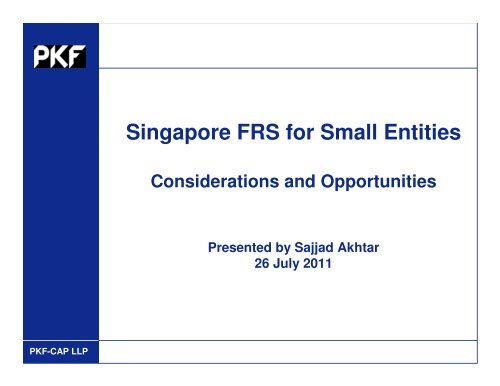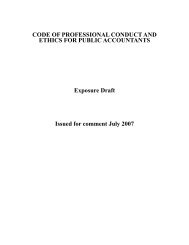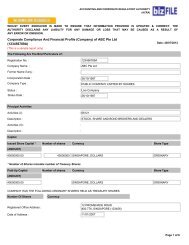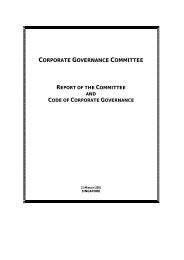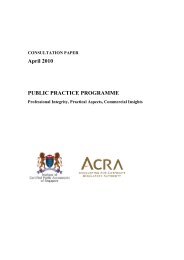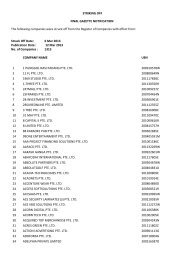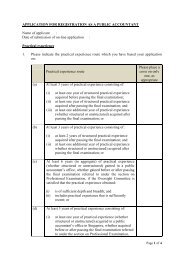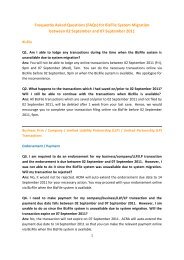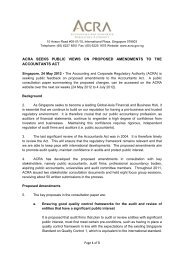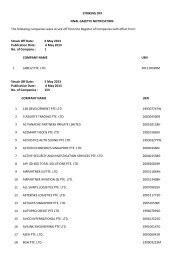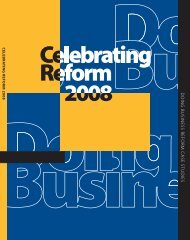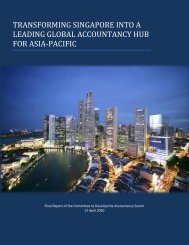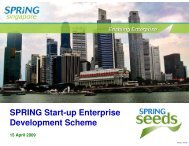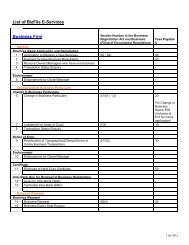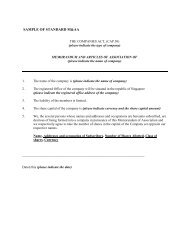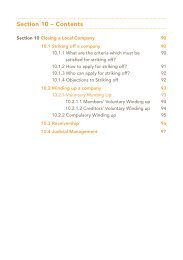Singapore FRS for Small Entities - ACRA
Singapore FRS for Small Entities - ACRA
Singapore FRS for Small Entities - ACRA
Create successful ePaper yourself
Turn your PDF publications into a flip-book with our unique Google optimized e-Paper software.
<strong>Singapore</strong> <strong>FRS</strong> <strong>for</strong> <strong>Small</strong> <strong>Entities</strong><br />
Considerations and Opportunities<br />
Presented by Sajjad Akhtar<br />
26 July 2011<br />
PKF-CAP LLP
S<strong>FRS</strong> <strong>for</strong> <strong>Small</strong> <strong>Entities</strong><br />
Key Features<br />
PKF-CAP LLP
What is S<strong>FRS</strong> <strong>for</strong> SEs?<br />
• A 230-page self-contained global accounting framework<br />
tailored <strong>for</strong> smaller businesses’ needs and abilities<br />
• I<strong>FRS</strong> <strong>for</strong> SMEs was issued by the IASB in response to<br />
criticism from smaller businesses that full I<strong>FRS</strong> has<br />
become:<br />
–Overly complex, designed <strong>for</strong> listed companies<br />
–Does not serve in<strong>for</strong>mation needs of users of SME<br />
financial statements, and<br />
–Too costly to comply with<br />
• Adopted in <strong>Singapore</strong> as S<strong>FRS</strong> <strong>for</strong> SEs and effective from<br />
1 January 2011<br />
PKF-CAP LLP
Who can adopt the standard?<br />
• <strong>Entities</strong> that:<br />
– Do not have public accountability,<br />
– Publish general purpose financial statements, and<br />
– Meet the size test<br />
• Size test – qualify if meet 2 out of 3 criteria:<br />
1. Total annual revenue not more than $10 million<br />
2. Total gross assets not more than $10 million<br />
3. Total number of employees not more than 50 people<br />
• Disqualified if fail to meet size test <strong>for</strong> last 2 years<br />
PKF-CAP LLP
PKF-CAP LLP<br />
What are the key features?
S<strong>FRS</strong> <strong>for</strong> <strong>Small</strong> <strong>Entities</strong><br />
Considerations <strong>for</strong> Users<br />
PKF-CAP LLP
What should be considered?<br />
• Transition costs – staff training, accounting system<br />
changes, initial FS restatement and reconciliation<br />
• Future plans<br />
– Are size limits likely to be breached soon?<br />
– IPO plans<br />
• Groups – size eligibility and consolidation procedures<br />
• Loan covenants (ratios, whether required to use full <strong>FRS</strong>)<br />
• Dividends and bonus calculations<br />
PKF-CAP LLP
Who should not adopt the standard?<br />
• Companies who are marginal <strong>for</strong> the size test<br />
– Transition costs wasted if move back to full <strong>FRS</strong> later<br />
• Companies with plans <strong>for</strong> expansion or listing<br />
• Companies who are already com<strong>for</strong>table using full <strong>FRS</strong><br />
• Companies who are part of a group using full <strong>FRS</strong><br />
• Companies with particular accounting issues negatively<br />
affected by difference in treatment under <strong>FRS</strong> <strong>for</strong> SEs<br />
PKF-CAP LLP
Who should adopt the standard?<br />
• Start-up companies<br />
– No transition costs, can achieve immediate time and<br />
cost savings compared to full <strong>FRS</strong><br />
• Companies with no major expansion or listing plans<br />
• Companies who struggle with compliance with full<br />
<strong>FRS</strong> (eg no qualified accountant, use small audit firm)<br />
• Owner-managed companies with few or no external<br />
users <strong>for</strong> their financial statements ie who do not<br />
benefit from full <strong>FRS</strong> compliance<br />
PKF-CAP LLP
Practical implications of adoption (1)<br />
• Transitional provisions include<br />
– Opening balance sheet <strong>for</strong> comparatives adjusted<br />
– Disclosure of impact of transition including nature of<br />
changes in accounting policy<br />
– Reconciliation of equity and profit or loss as previously<br />
reported to amounts in opening <strong>FRS</strong> <strong>for</strong> SE figures<br />
– Optional exemptions <strong>for</strong> certain areas<br />
– Concession that if impracticable to restate opening<br />
figures, disclose and restate at earliest possible date<br />
• Can’t pick and choose between full <strong>FRS</strong> and SE<br />
• Reference to full <strong>FRS</strong> if situation not covered by <strong>FRS</strong> <strong>for</strong><br />
SEs – may do so but not required to (para 10.6)<br />
PKF-CAP LLP
Practical implications of adoption (2)<br />
• Examples of differences between full <strong>FRS</strong> and simplified<br />
treatment in <strong>FRS</strong> <strong>for</strong> SEs:<br />
– R&D and borrowing costs – expensed not capitalised<br />
– Goodwill/ intangibles – amortised, useful life deemed<br />
as 10 years if difficult to determine, no annual<br />
impairment reviews<br />
– Revaluation model not allowed<br />
– Investment properties – FV or PPE, no cost model<br />
– No recycling of eg FX differences on net investment in<br />
<strong>for</strong>eign operation on disposal<br />
– Tax treatment based on ED <strong>for</strong> revised full <strong>FRS</strong><br />
– Financial instruments - choice of using full <strong>FRS</strong> 39<br />
measurement & recognition, or simplified section 11/12<br />
based on amortised cost or fair value.<br />
PKF-CAP LLP
S<strong>FRS</strong> <strong>for</strong> <strong>Small</strong> <strong>Entities</strong><br />
Considerations and<br />
Opportunities <strong>for</strong> Auditors<br />
PKF-CAP LLP
Implications on the audit<br />
• Initial audits of first financial statements after adoption<br />
may be more complicated due to transition issues:<br />
– Changes in accounting policies<br />
– Different financial statements <strong>for</strong>mat and templates<br />
– Reconciliation of impact of transition<br />
• In future, the simplified framework should result in<br />
simpler audits:<br />
– Fewer disclosures to deal with<br />
– Less management judgement and choice to assess<br />
– Simplified accounting treatments easier to audit<br />
– Less frequent amendments to the standard<br />
PKF-CAP LLP
Practical considerations <strong>for</strong> auditors<br />
• Training needs – staff need to be familiar with S<strong>FRS</strong> <strong>for</strong><br />
SEs as well as full <strong>FRS</strong>, and their differences<br />
• Forward planning – identify clients who would benefit<br />
from adoption<br />
– Be proactive in advising them<br />
on all considerations<br />
– Allow time <strong>for</strong> transition<br />
issues and problems<br />
Eg company with R&D costs<br />
will need to expense, is that ok?<br />
PKF-CAP LLP
Implications on fees<br />
• A simpler audit should be faster and cheaper ie may<br />
result in reduced fees<br />
– Particularly in context of likely increases in audit<br />
exemption threshold<br />
• BUT time saving <strong>for</strong> both auditor and client should be<br />
seen as a business opportunity<br />
PKF-CAP LLP
Opportunities <strong>for</strong> auditors<br />
• How can SMPs make up <strong>for</strong> fee income lost due to<br />
fewer and simpler audits?<br />
• How else can SMPs be of value to their SE clients?<br />
CONSIDER OTHER SERVICES<br />
Existing clients<br />
New clients<br />
PKF-CAP LLP
PKF-CAP LLP<br />
Accounting services
PKF-CAP LLP<br />
Other assurance and tax services
PKF-CAP LLP<br />
Business support services
PKF-CAP LLP<br />
Advisory services
Next steps<br />
• Do you have the resources in place to expand your role in<br />
other service areas?<br />
– Existing expertise and resources<br />
– Training needs<br />
– Recruitment criteria <strong>for</strong> new staff<br />
– IT software requirements<br />
• What services do your<br />
clients want and need?<br />
– Ask them!<br />
PKF-CAP LLP
Conclusion<br />
• S<strong>FRS</strong> <strong>for</strong> SEs can be a very useful reporting framework<br />
<strong>for</strong> the right size and type of companies<br />
• Take initiative to advise clients on adoption<br />
• Plan ahead <strong>for</strong> the implications <strong>for</strong> your practice of<br />
differential reporting and likely increases in the audit<br />
threshold<br />
PKF-CAP LLP
PKF-CAP LLP<br />
Any questions
PKF-CAP LLP<br />
Thank you


